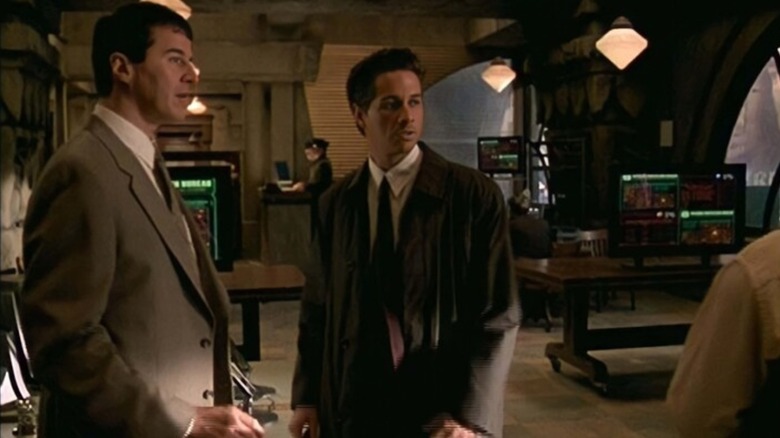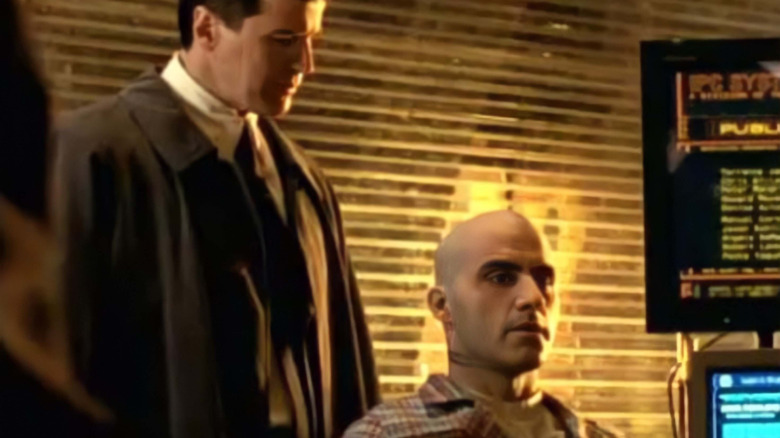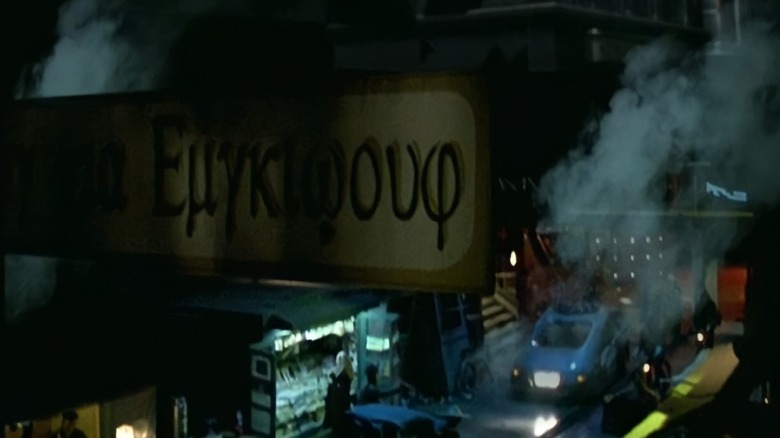This Underrated Sci-Fi Series Combined The Worlds Of Blade Runner And Total Recall
"Total Recall 2070" was created by Art Monteraselli and was based on the works of celebrated sci-fi author Philip K. Dick. Dick, many may know, authored multiple novels and short stories that have been adapted into successful and influential sci-fi movies. His 1968 story "Do Androids Dream of Electric Sheep?" was famously adapted into Ridley Scott's 1982 film "Blade Runner," often held up as one of the most visually striking sci-fi movies of its era. His 1966 story "We Can Remember It For You Wholesale" was transformed by director Paul Verhoeven into the 1990 ultra-violent classic "Total Recall." In 2002, Steven Spielberg adapted his 1956 short story "The Minority Report" into an excellent feature film just called "Minority Report." Dozens of other movies besides have used Dick as a source of inspiration; those three are simply some of the more popular.
Dick was always fascinated with the machinations of memory, and his stories were ambitious and high-concept. He liked to use the tropes of film noir and police fiction to delve into his heady sci-fi ideas, making for genre mash-ups that are irresistible. His stories generally have a tone of fear and paranoia, often so powerfully felt that they become existentialist. That said, he was a practically minded fellow with a realistic worldview; he famously once said that "reality is that which, when you stop believing in it, doesn't go away."
In January of 1999, a notable TV adaptation of Dick's work made its way to Canadian television in the form of "Total Recall 2070." The series might have been named after Verhoeven's 1990 film, and it shared a few common elements, but it was more a general adaptation of Dick's ideas, stories, and sci-fi worlds. In practice, it has more in common with Ridley Scott's "Blade Runner" than "Total Recall." The series was short-lived — it only ran 22 episodes over its single season — but it was ambitious and weirdly great, in its own way.
Total Recall 2070 has more in common with Blade Runner than Total Recall
It's worth noting right away that "Total Recall 2070," although based on a Dick adaptation, doesn't credit the author. Because it's not a direct adaptation of any one Dick story, "Total Recall 2070" might be said to give off a Dick vibe instead. It's a fascinating bouillabaisse of Philip K. Dick ideas, plucked wholesale from the public consciousness.
Like its namesake, "Total Recall 2070" does feature a "vacation" company called Rekall, which can implant the memories of a four-star vacation into your head without you having to actually go anywhere. Rekall, however, doesn't play a large part in the series as a whole and is merely the site of an android attack in the show's pilot episode. The main character is Detective David Hume (Michael Easton), who loses his partner in a shootout. Philosophy nuts will immediately point out that David Hume was also the name of the famed Scottish empiricist who vehemently rejected Plato's ideas of the metaphysical. Hume is assigned a new partner in the form of Ian Farve (Karl Pruner), and it takes Hume a few weeks to realize that his new partner is an android. As one can see, androids are not illegal in this world as they are in "Blade Runner," and the word "replicant" is never used. Like "Blade Runner," however, a lot of time is spent contemplating the nature of android brains. Perhaps they do dream of electric sheep.
"Total Recall 2070" is also a marvelous anti-corporate screed. It takes place in a future where the governments of Earth and Mars have been united in a Federation-like alliance called the Interplanetary Alliance, but its influence is controlled by a supra-corporate entity — an oligarchy of billionaires — called The Consortium. Each one of the members of the consortium controls a different avenue of the planet's production, from food to transport. In this regard, "Total Recall 2070" remains frustratingly prescient.
Total Recall 2070 was cut short
Like "Blade Runner," too, "Total Recall 2070" is concerned primarily with the shifting nature of an artificial consciousness. The Rekall memory implants, some androids figure, might be used to unlock the nature of their consciousness. The show is downbeat, even bleak at times. Its sci-fi crime stories surround pain, death, and crimes like kidnapping, murder, and human trafficking. The show is incredibly violent and pushed the limit of what was allowed on Canadian TV at the time.
As one can see from the photos above, "Total Recall 2070" borrowed its aesthetic from "Blade Runner," too, creating a 2070 that blended multiple cultures and architectural styles into a steamy, dark, film noir universe. The sex and violence were a natural outcropping of film noir, but a lot of the more objectionable material had to be edited out for its American release. Anyone seeking the series in the United States will have to be careful that their online screeners may be of the edited versions. Buying a DVD box set from the Canadian second-hand market may be the only way to see the violent/sexy version these days.
Although "Total Recall 2070" was presented as a "case of the week" series, there were also story arcs at work, including a tantalizing story about Mars and the existence of hybrid human/android DNA. Sadly, none of the story arcs were resolved before the series was canceled. There are a lot of dangling threads at the end. But the series is definitely worth seeking out. It has very high production values and a lot of bleak, thoughtful philosophies. Dick may not have been credited, but one can see his influence in every frame. It's worth seeking out and spreading the work. It's a pity that it has become an oddity, almost lost to time.


